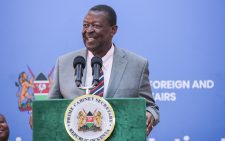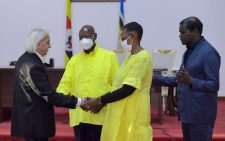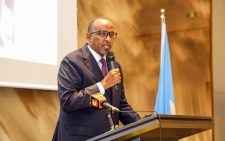Artistes come together to make lullaby playlist

On January 13, 2022, children’s earworm Baby Shark made YouTube history as the first video to surpass 10 billion views. First released in June 2016 courtesy of South Korean educational entertainment giant Pinkfong, the dance surpassed previous leader Despacito in November 2020. This was an indication enough that children entertainment is a massive sector, which has been ignored by a lot of industry players for many years.
However, Platoon —a London-based artiste services, A&R, and music distribution company—has never shied away from offering entertainment even for the very little people. Last week, the Apple Inc-owned firm set out to celebrate the ‘Africa Month’ with African Lullabies Part 2, the second instalment in the children’s music series African Lullabies.
Taking a Pan-African approach, the project features top talents from around the continent including Kenya’s Karun, a former member of the Camp Mulla pop group. Others are Asa, Ayra Starr, Teni, Simi, WurlD, Olayinka Ehi, Tresor, Manana, Aymos and Ntsika.
Over and beyond
“Where its predecessor, African Lullabies Part 1, focused on original compositions by South African singers and songwriters and was sung across various languages, African Lullabies Part 2 expands beyond the borders of South Africa and creates a diverse offering of children’s music in various African languages for babies on the continent and in the diaspora,” read a statement from Platoon.
Most of the recordings are original compositions by the artistes, drawing from their experiences in parenthood, and African folklore, while others are interpretations of previously released material arranged and re-recorded as lullabies.
“It’s really delightful to have been asked to make a children’s song. This is my first children’s song, and I never thought I would ever do this. I really enjoy making calm, relaxing music, so this made sense. I never saw children’s music as something that I would do, but given the opportunity, it’s something that I would jump on. I have a son and I like children, it’s a cool challenge,” Karun tells Spice.
Karun, whose song Dream Lullaby (Wakariru) is among the 12 on the playlist, intimates that the project was also a learning curve for her.
She says, “I learned a lot about myself when creating this song. I produced the whole song, I love layering vocals, and I was playing around with different effects. I learned about phasing. It was a lot of learning on the technical side of it. I also learned that there’s a lot more I need to connect with my mother tongue Kikuyu. My grandmother and me connected over her helping me remember the lullaby at the end of the song. Kikuyu is my first language, but I forgot it a long time ago, so I learned that I’m still connected to it.”
Since July last year, Platoon has ventured into the children’s music space after recognising the vital need for a rich and diverse offering for children that catered to all, regardless of the language they speak or the country they’re in, partnering up with musicians and children’s content creators from across the globe and many languages, to become one of the leading children’s music curators in the world.
On her part Nigerian singer Ayra Starr says, “Growing up, we made up songs ourselves as children. At school, we used to make up our own lullabies because we didn’t want to have to sing to Twinkle, Twinkle, Little Star. When I started making the song (Stars), I wanted to make something that my younger self would be so proud of. It’s important for more African lullabies to be made because African children need more representation. We didn’t see a lot of that growing up. I think that African lullabies will inspire children in different ways.”
Her sentiments are supported by fellow singer WurlD, who feels more children’s songs would make a huge difference in the world.
“It’s important for more African lullabies to be made. There’s so much more we can do in music and this is one of those aspects. This is an experience I’d love to share with my children one day when I get them. In the creative process, I learned that I could actually be doing a lot more with my songwriting and sound. Creating my first children’s song Never Alone means that I’m growing as an artiste and using my art to do more than the commercial, usual norm and it feels good,” he says.
Uncertain and restless
South African artiste Manana says his lullaby In The Morning is true to the tradition of African lullabies. “Speaking of peace with the uncertainty of night approaching, I put myself in the mind of a child when writing this. I was thinking of what I would like to hear if I was restless and unable to sleep,” he says.
In conclusion, Karun feels this project will open more opportunities for more African lullabies to me made specially for African children.
“I would have loved to have more lullabies made by Africans, made by Kenyans, just available for sure. Growing up, I don’t feel like I lacked lullabies, but there was a disconnect with the songs that were available. I’m so far removed from the culture that made songs such as Rock-aby Baby. I was so confused. It makes a big difference to have someone from where you’re from and being able to connect with what they went through in the context of the song.”












